
2012-03-20
“Whatever Happened to the Guy Stuck in the Elevator” describes a morning in which everything goes wrong for the story’s first person protagonist, a young, single, apartment- dwelling businessman. His razor breaks after he has shaved only half of his face, and he is forced to take the stairs down from his 15th floor apartment because the elevator is jammed. On the 5th floor he discovers a man stuck in the elevator and promises to get help. He finds no one at the security window, so he asks people waiting with him for the bus if he can use their cell phones to call 911. More…

2012-03-23
The monograph compares the links between medieval Japanese and Chinese literature. The text answers the question of how Japanese integrity of perceiving the world andthe vitality of Japanese speech was preserved under the conditions of the dynamic interaction of texts.

2012-03-25
Throughout the history of its representation in the European and North American eyes, China has been viewed as unique, but at the same time placing it on a politico-cultural grid was perceived as a necessity to make theories and discourses work. After a brief period of positioning China in post-socialist transition, its place in representation changed to an exploitative pool of cheap labour and then – to an emerging superpower. Therefore China is as much a testing ground for theories about the development of capitalism and world political systems as it was in the 19th century. The empirical part of this publication discusses how cultural theories, symbols and images powerfully shape the discourse around China in rationalist, economically oriented elite media, and then discusses the role of experts, who position themselves as intermediaries, fluctuating in the field of the rules of various genres of knowledge production. Based on media discourse analysis and interviews with the experts, the author shows how different methods of knowledge production and claim-making interact in shaping political positions at the EU level.

2012-05-09
This book "Fashion and intercultural stereotypes. The case of the articles on Japanese couturiers in Le Figaro and Libération" presents how French newspapers represent Japanese fashion designers who create “Japanese phenomenon” in Prêt-a-porter of Paris in 1980s and their works, through the discourse analysis of French School. The author analyses how two French representative national newspapers Le Figaro and Libération, which are oppositely politicized, represent the Japanese fashion creators and their works, by means of stereotypes on Japan classified by French linguist Jean-Paul Honoré into 8 points: puissance, order, mystery, refinement, rigueur, pragmatism, past and modernity. More…
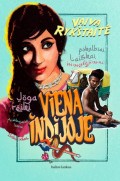
2014-11-06
The author tells about her own experiences while travelling in India. However, it is not a tourist guide book, which is why there are no picturesque routes or references to comfortable and popular hotels. She narrates without glamor and idealization – whether it is the places she visited or the people and their relations. And in her trip there were many various meetings, starting the ones with the westerners, who were searching for the enlightment in India, or just were in love with the country, and finishing with meetings with the locals with all their complex rituals, traditions, and subtleties of interaction. More…
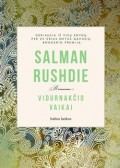
2014-11-23
Saleem is born precisely at midnight, August 15, 1947, therefore, exactly as old as the independent republic of India. He later discovers that all children born in India between 12 a.m. and 1 a.m. on that date are imbued with special powers. Saleem, using his telepathic powers, assembles a Midnight Children’s Conference, reflective of the issues India faced in its early statehood concerning the cultural, linguistic, religious, and political differences faced by a vastly diverse nation. Saleem acts as a telepathic conduit, bringing hundreds of geographically disparate children into contact while also attempting to discover the meaning of their gifts. More…

2014-11-25
Aurelijus Zykas in his book ‘The colors and flavors of Japan’ introduces the reader with this distant country. The author, basing the narrative on his own personal experience, tells the reader about his life in Japan, spent living in two very different cities – Tokyo and Kanazawa. The book is split in two parts – the first part tells mostly about the years spent studying in Kanazawa. The second part concentrates on the life in Tokyo, while studying in Waseda University and working in the Embassy of the Republic of Lithuania in Tokyo few years later. This books is a perfect choice for anybody who is interested in Japan and its culture. More…
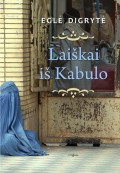
2014-11-30
The author in her book tells an interesting story about how to survive in war’s zone, how to remain alive. She tries to show the real Afghanistan, to deny some myths, to tell more about culture and traditions that are essentially different from Lithuanian. Egle Digryte openly talks about women’s position in Afghanistan and attitudes towards foreign, warn about dangerous in Afghanistan.
Also, necessary to mention that you could find a lot of colourful illustrations in the book that shows country’s life. More…
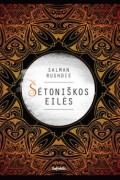
2014-12-04
Sensational novel, closing the Indian Muslim community, for the desecration of Islamic, Iranian spiritual leader Ayatollah Ruhollah Khomeini in Tehran published a fatwa – a death sentence to the writer on the radio – this is what you can see in the Google search box after entering “Satanic Verses”. After reading this kind of article curiosity overcomes, the reader grabs the novel not even making a glance at the back of the book to check the description, they read the first page the ruminative gaze begins, after twenty pages they get to hundred trying to understand what his fantasy had to generate, but no understanding comes to mind, but this sense coms not in vain. This happens due to a simple reason, the person reading this novel perhaps is the westerner (you may ask, why westerner? Because in Islamic world this book is prohibited), many things he does not understand is because he has shortfall of information, because everything in the novel has a religious context, starting from the Islamic religion and ending with Veda teaching. When reading this kind of a book one should find put more about great religions, because it is a major “spice” – a religious context. More…
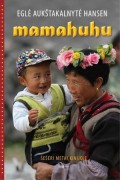
2015-11-30
The book “Mama Afrika” writer Eglė Aukštakalnytė-Hansen that had to move form Kenia to Sanhay, so she could wrote a book “Mamahuhu, Šešeri metai Kinijoje”, where she told her experience. The author Eglė Aukštakalnytė-Hansen tries to show the boundless (so much geographycal area, so much cultural meaning) China as a huge colage, that every detail is distinctive, immpresive and worth attention.
At first the reader is suprised and intreaged by the book title „Mamahuhu“. This lingvistic crossword meaning is expalined by the author in the book, but the reader can interpret it on their own way. Also there is many photographs, that are captured by the author from various China regions. Photos and signatures helps you understand what kind of different country it is on people, environment and traditions point of view. More…










